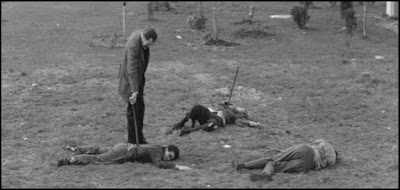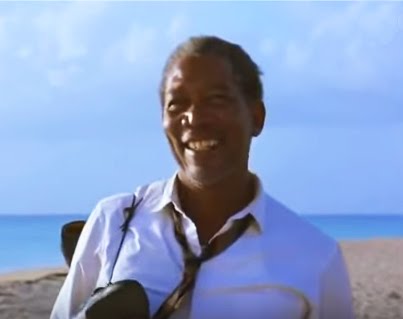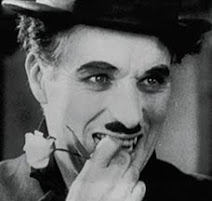(This, from 2012, when I actually spent more time and energy writing and posting.)

Over the long weekend that everyone took, I went to see 2012. It didn't help that I began coming down with a cold right there in the theater, but it wasn't a bad film, really -- and as a friend warned me over Thanksgiving dinner, "You'll only go to see the special effects": They were spectacular, true; but Woody Harrelson's fuzzy-wacky Pabst-Drinking conspiracy radio host, broadcasting from the edge of the Yellowstone caldera as it erupted, almost eclipsed the digital magic...

Will Smith as The Man, and Abby (Or Kona), as Sam The Pooch
Back at home, lying around with The Cold, I flipped through some of my 200 DVDs and found the 2008 release of I Am Legend with Will Smith -- which was a fairly good film, but only in it's alternate release version. I glanced at the Criterion edition of Fritz Lang's M; I ran a finger across the cover of Beetlejuice; I considered Pixar's The Incredibles (Dudes!! Where's the SEQUEL???). But it was "I Am Legend" that gave me pause.

Ahnold's (Supposedly) 'Final Film', Canceled By Voters
Smith had been offered the starring role as Dr. Robert Neville, because the first Star cast, Arnold Schwarzenegger, had become the Governator. I strongly considered watching Smith (a more than decent actor), but finally passed on it to check out the simple, unexpected wonders of the Teevee, and I was glad I did.
Here in San Francisco, a local cable public access channel occasionally runs films when they need filler for a spare ninety minutes or so (occasionally, they don't even run the full feature). The prints are always bad, and the sound worse, but it's interesting to see what the kids down in the studio will pick. A few weeks ago, they put up Romero's original Night Of The Living Dead; this weekend, it was The Last Man On Earth -- which is, aber natürlich, the earliest version of 'I Am Legend'.
There have been any number of End-Of-The World-As-We-Know-It stories and films based on the elements of I Am Legend: 28 Days Later; The Stand; the late-70's BBC series, Survivors (certainly, "Shaun Of The Dead"); in an odd kind of way, even The Puppet Masters and Invasion Of The Body Snatchers.
These stories involve a nuclear war/alien incursion/mysterious plague (sometimes man-made) which kills and/or radically alters its victims; somehow, they turn into Zombies/Vampires/Unemotional Communists Alien Replicants; and, there is a single person/small band of plucky survivors, trying to find others who survived as well and get on with living in the Brave New World.

Last Man was released in the U.S. in 1965. It began as a property owned by Hammer Films in England, with Richard Matheson writing a script after his classic 1954 novella, "I Am Legend".

A Bantam Paperback: Forty Cents.
(Matheson later wrote another novella, "Bid Time Return", which became the 1980 cult film, Somewhere In Time; later, another novel, "What Dreams May Come" was turned into a fairly good movie about life in the Afterlife, with Robin Williams, Cuba Gooding Jr., Annabella Sciorra and Max von Sydow.)

Hammer Films passed on turning the acquisition into a film, but sold production rights to the 'concept' (without Matheson's script) to a cut-rate American producer who filmed it quickly in Europe to save costs. It was directed by Ubaldo Ragona, whose only other films were Fiesta In The Caribbean and The Virgin and The Bastard -- fortunately for Ol' Ubaldo, "Last Man' is a cult classic, the only work he'll be remembered for.
"By night they leave their graves, crawling, shambling, through empty streets, whimpering, pleading, begging for his blood!" Said the film posters. How they signed Vincent Price to play the title role and add the voice narration, no way to know -- except, he did get a European vacation!

Nope; It's Not The L.A. Coliseum... Price, Hunting Vampires In The Amphitheater At 'Eur',
The Rome Suburb, Home To Mussolini's 'Architecture Of Fascism'
As a kid, I'd read Matheson's novella, set in a post-apocalypse Los Angeles. As a sort-of Southern Californian, it was easy for me to visualize L.A. after a Zombiesque, vampire plague. However, Last Man wasn't shot in SoCal; it was filmed in and around Rome, the Eternal City: The architecture, the landscape, the foliage was supposed to be American -- but in college, as I sat getting loaded and watching this thing on teevee, it looked... well, Jeez; it was Italy, for cryin' out loud. Even after several bottles of Chateau Du Safeway, the bunch of us watching the film could spot most of its really obvious 'goofs'.

Wandering West Covina In Search Of The Undead? Nope; Still Eur.
My favorite "production errors" were seeing vehicles driving in the far background in a number of shots of 'deserted America'; or, Vincent Price (who has been out hunting vampires for two or three years), needing to stock up on garlic to keep vampires away -- and stopping to pick up a few garlands in an abandoned grocery store. Garlic won't last in my kitchen for two weeks, let alone three years.
My favorite bits were the cars Price drove -- which, between cuts in the same sequence, would change from Chevrolets to Fords and back again. I hadn't seen goofs that obvious in a film since spotting a dead slave wearing a wristwatch in the slow-pan-over-the-battlefield shot in the last reel of Spartacus.

"Not tonight, Bobby; I have a headache... be a dear and get me
one of our daughter's pet rats, a razor blade, and a straw?"
Following the line of Matheson's novella, Price played Robert Morgan, an ordinary man, uninfected (apparently due to a natural immunity) by a plague which arrived from Europe. In a series of flashbacks (also from Matheson's novella), Morgan's daughter becomes ill with the plague, but he and his wife try and nurse her to health. The daughter goes blind; his wife becomes ill with the plague; but he believes they can get through this... until first his daughter, then his wife, dies.

Vincent Price As Morgan, One Step Away From Cracking Up
(Photo: Your Best Friend: dvdbeaver.com)
Now he has a problem; he knows they'll become vampires. Morgan can't bear to stake-and-garlic his own wife and child, so he buries them a long distance from their house. As he knew they would, they return to their old home, every night, standing on the overgrown front lawn and calling out to him. In a grisly way which he can't even admit to himself (They'll come back, man -- and you want them to), Morgan can't bear to be completely separated from the ones he loves, his now Zombized Vampire family, calling to him out of the night.

"We Got 'Glow In The Dark' Play-Doh, Baby... It's So Koooool..."
Even his best friend (also seen through pre-plague flashbacks) appears with them to taunt Morgan, crooning for him to come out and join them... strangely, his Sta-Press hairdo remains the same after he goes over to join the Legion Of The Undead... and occasionally, he tries the ol' White House State Dinner Gate Crash through the front door...

"We Want To Meet The Obamas And Suck their Blooooooood!!
But, he does more than fight the vampire-survivors just to stay alive; he actively hunts them, day in and day out. He broadcasts on radio, looking for other survivors, without an answer. Suddenly, he comes across an apparently uninfected girl, after not having seen another 'normal' human for years -- and slowly, Price discovers that she's one of them ... part of a developing new society -- of vampires.

Price Staking His Claim As King Of The Vampire Hunters
They've developed a serum which keeps the weird, bacteria-like contagion that results in vampirism at low levels in the blood, which prevents them from lusting for it to survive, and to venture out in daylight. It allows the girl to pass for 'normal', and to get close to Price so that he can be neutralized. Because they see themselves as victims of Price's relentless vampire hunting.

"Don't Talk Trash To Me About The Dodgers -- Ever!!"
This is the masterstroke role-reversal Matheson slowly introduces into his story: We initially see The Man as lonely hero, lost in a decaying, shabby world and surrounded by infected, homicidal monsters. But from the perspective of the New Vampires, trying to create order and structure in a world changed by a disease without a cure, they've adapted to survive -- and to them, Price is no hero: He's the Outsider, his daytime staking and killing the threat to their existence.

"But -- But I Can't Be The Monster -- You Are !!!"
(It's The End Of The World... And You're Wearing A Tie?)
Their serum liberates them from most of the aspects of Vampyrism -- enough to build a New Order. Price is their monster, the thing New Vampire parents use to frighten their children before going to sleep, a boogeyman who comes in the daylight with garlic and a stake. And, he has to die, so that they can live without fear.

Irony: A Bus In Rome (Where The First Version Of Matheson's Story Was Filmed), Advertising the Latest Version, "I Am Legend" (2008)
The next take on Matheson's story, The Omega Man, was released in 1971 with Charlton Heston -- who made Planet Of The Apes in 1968, and would go on to star in an honest classic, Soylent Green, in 1973. Oddly, in a bit of deja vu, 'Omega' was made after purchasing the rights from Hammer Films -- which still had been considering making a film from Matheson's script.

In Hammer's vision, the property had a new working title -- "Night Creatures" -- but British censors considered the concept of an empty world with decayed corpses and vampires too graphic for 1970, and again sold the production rights to Americans... but the plot wasn't entirely okay with censors here, either (there was plenty of real gore on the nightly news, courtesy of the war in Vietnam), so some changes had to be made.
Omega Man was set in L.A., and Heston's character was named Robert Neville -- both points identical to Matheson's story. But the plague survivors in Neville's Los Angeles were not nocturnal vampires -- just albino, deranged paranoids, wearing black monk's cowls and Ray-Bans, suffering from a terrible sensitivity to sunlight. They were Luddites, to boot, organized around an anti-technological dream in a group called "The Family".

ZERBE: These wigs itch. How long does it take to set up a camera?
KIRKPATRICK: Got that right. It's fucked up, man.
ZERBE: Hey, Lincoln; we wear these shades all the time. Right?
What the hell -- let's get high! Who's gonna know?
KIRKPATRICK: I'm down with that, man. You holding?
ZERBE: I think those two chicks who say, "More! Burn it more!" have
some pretty decent shit. Let's go ask. Not like we don't have time.
Heston's nemesis was the leader of the Family, a former L.A. Teevee news commentator named Matthias ("You -- you creature of the wheel!"), played by Canadian actor Anthony Zerbe (a strong supporter of Werner Erhard's 'est' training, back in the day). Before this, Anthony had a small, supporting role opposite Heston in 1968, as a ranch hand in the western, Will Penny. And, Matthias' right-hand 'Family' member, Zachary ("Just let me put some explosive to him, brother -- just a little nitro!"), was played by Lincoln Kirkpatrick -- who in 1973 would appear opposite Heston in Soylent Green as a Catholic priest tortured by the secret of Soylent after it was revealed to him in confession by Joseph Cotton.

Anthony Zerbe, Character Actor Par Excellance --
A Softer version of Anthony Hopkins, in the 1990's
I wonder if Zerbe, Kirkpatrick and Heston ever talked on set about prior shoots working together, or if that wasn't considered appropriate when you worked with someone whose credits included playing Judah Ben-Hur and Moses and Andrew Jackson and Michelangelo.

When The World Ends, You Get To Use Automatic Weapons.
It wasn't a terrible movie; it was Heston's second science fiction film, after Apes and before Soylent. It had a typical look-and-feel of back-lot production values possessed by many Columbia, 20th Century Fox and Warner Brothers films from the late 60's and early 70's. Watching Heston's acting (he seemed to be playing Robert Neville as if it was his Michelangelo from Agony and the Ecstasy) made me feel his career had to be headed for the toilet. The end of the film has Heston's Robert Neville dying in a posture that is too obviously like that of Christ on the cross, and no one watching could fail to feel the weight of the Ham we were being asked to bear.

Chuck; Ah, It's About The Symbolism, Man. Painful; Ya Know?
I felt excruciatingly embarrassed for him -- Heston, who had played so many great roles in film, was doing burned cheese sci-fi?. But, I took all of that back retroactively when he became the public face of the NRA -- and I've been an NRA member.
( I'm a fan of end-of-the-world films -- and, hey; you really want to be frightened? See the 1984 BBC production, Threads, which was the UK's version of 'The Day After'. I guarantee you won't sleep for a week. No shit: I Guarantee It.)
(In fact, if you look carefully at the film's poster, down at the bottom, below the credits in very small type is the simple statement, "This Film Will Not Just Frighten You; It'll Fuck You Up For Life". )





































